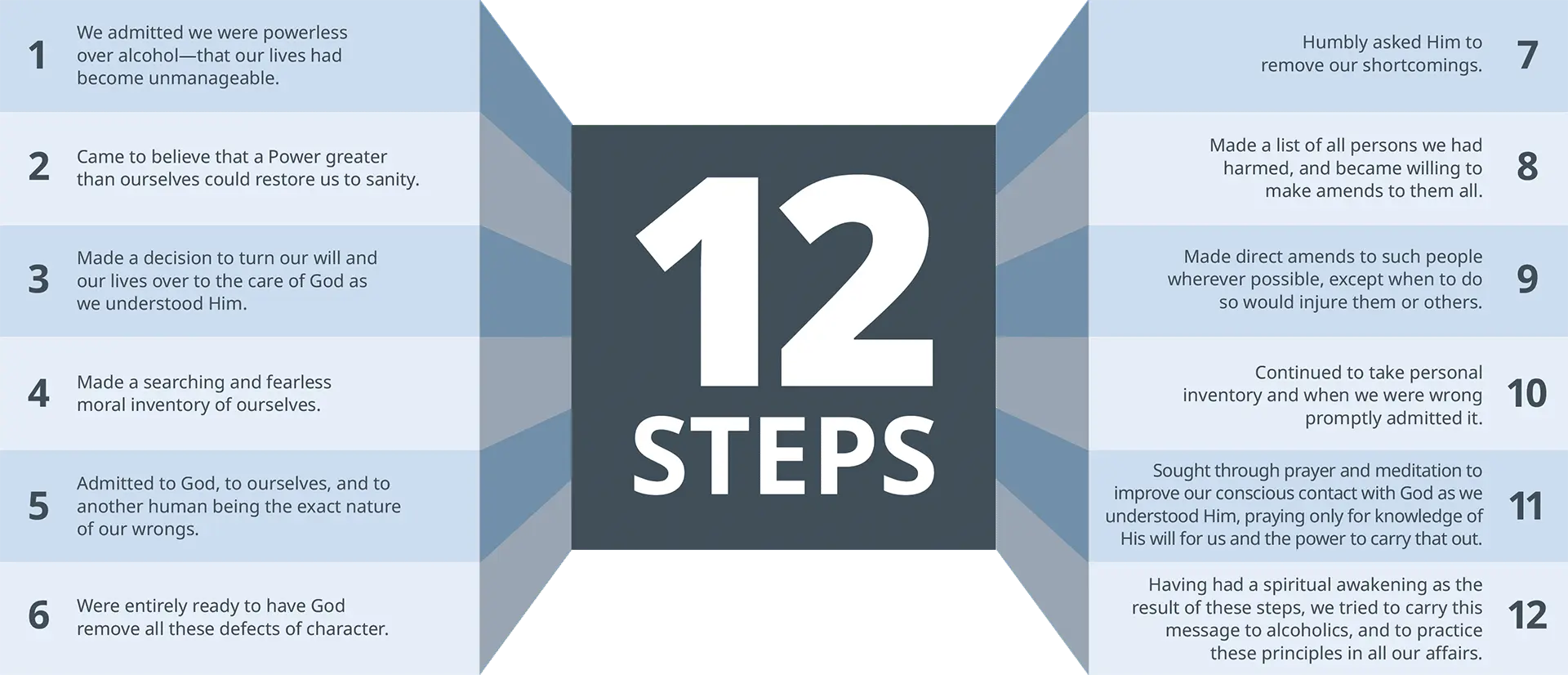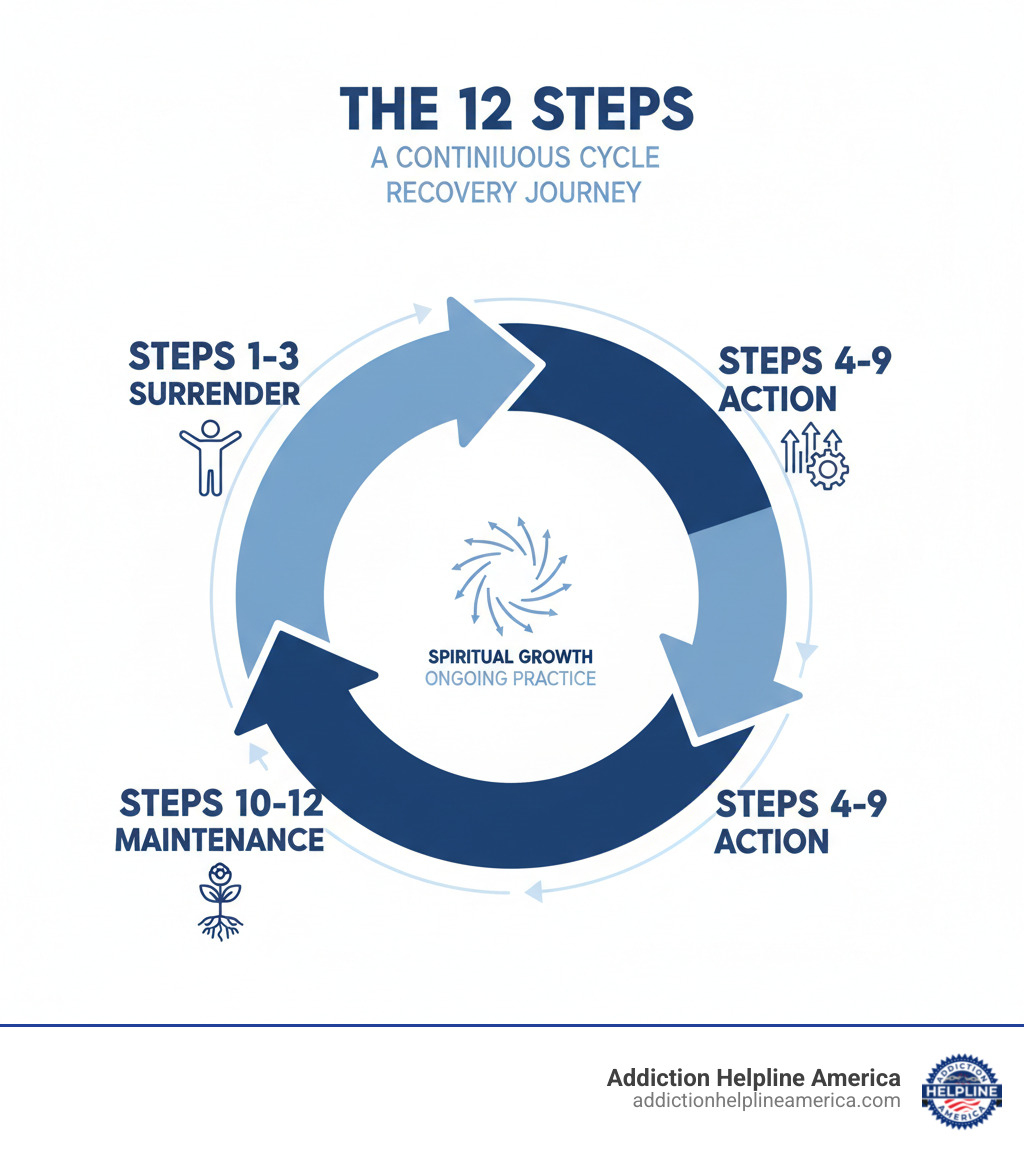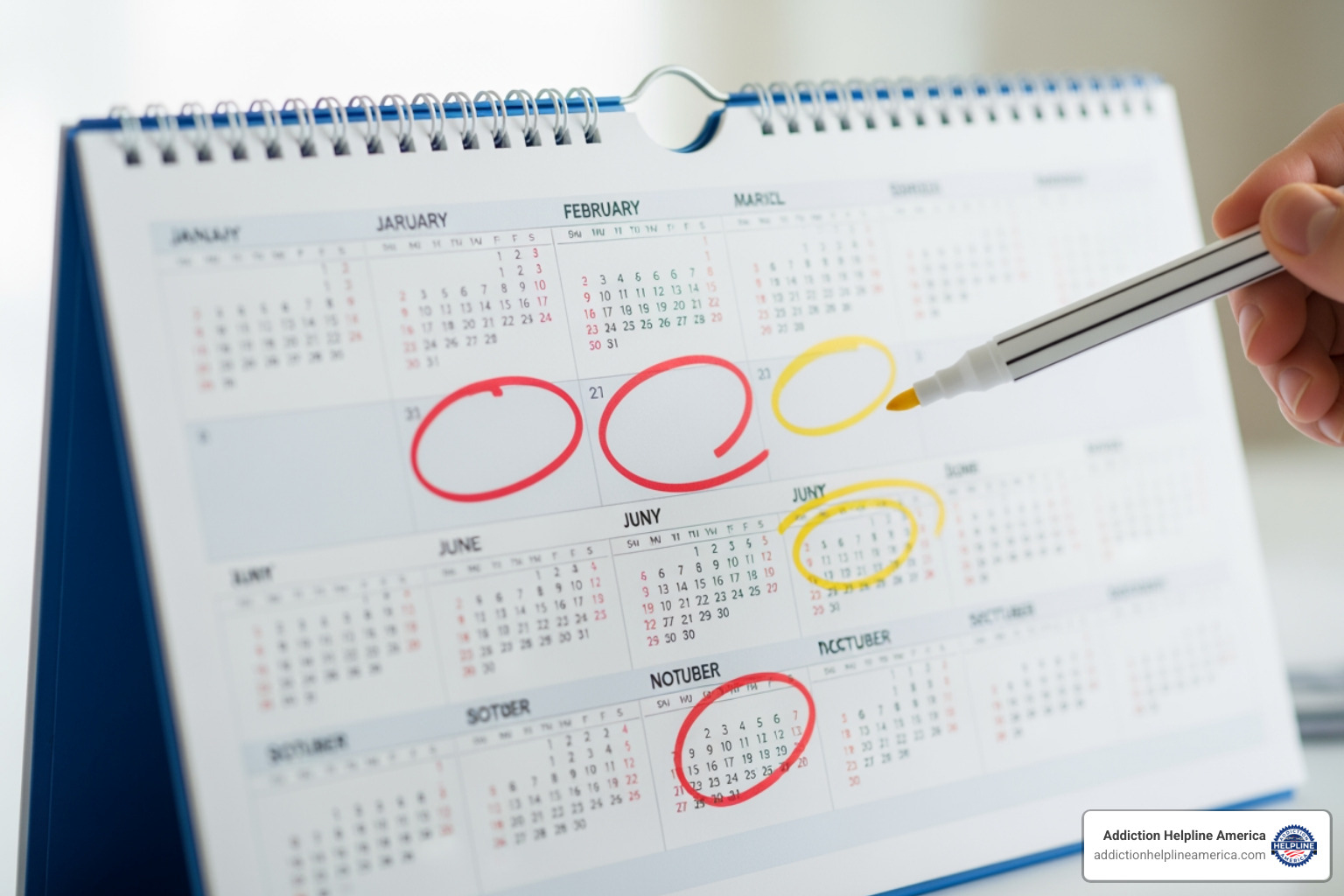
Why 12-Step Program Support Can Change Your Life
Struggling with addiction? 12 step program support offers a proven, free, and accessible path to recovery. You’re not alone, and there is a solution.
What is 12-Step Program Support?
- Free peer-based support groups like Alcoholics Anonymous (AA) and Narcotics Anonymous (NA)
- Structured recovery approach based on spiritual principles and mutual aid
- Community of people who share experiences, strength, and hope
- Available worldwide with over 114,000 groups and 2.1 million members
- No cost, no requirements except a desire to stop drinking or using drugs
- Proven effective: Research shows participation in AA leads to higher abstinence rates than cognitive behavioral therapy alone
How 12-Step Support Works:
- Attend regular meetings (in-person or online)
- Work through the 12 Steps with a sponsor’s guidance
- Share your story and listen to others
- Build a sober support network
- Help others in their recovery journey
Nearly half of all U.S. treatment centers use 12-step models because they work. Research shows combining formal treatment with 12-step programs improves outcomes.
At Addiction Helpline America, we connect individuals and families with 12 step program support as part of a comprehensive recovery plan. Our team helps you find local meetings, understand treatment options, and access 24/7 support.
12 step program support basics:
Understanding the 12-Step Model: History, Principles, and Steps
The 12 step program support model has helped millions recover from addiction through its principles of honesty, humility, and service. It’s a community of peers who understand your struggle because they’ve lived it. Originating from two individuals helping each other stay sober, their approach, documented in “The Big Book,” offers hope to those who felt recovery was out of reach.
The History and Core Philosophy
Alcoholics Anonymous began in 1935 when stockbroker Bill Wilson and surgeon Dr. Bob Smith, both struggling with alcoholism, finded they could stay sober by helping each other. From the spiritual principles of the Oxford Group, they developed a program for alcoholics, framing addiction as a disease requiring a spiritual—but not religious—solution.
The philosophy of 12 step program support rests on several core ideas. It begins with surrender—admitting powerlessness over addiction. This opens the door to hope, a belief that a power greater than oneself can help. The work involves taking a moral inventory, making amends to those harmed, and experiencing a spiritual awakening. A key component is service: helping others as a way to reinforce one’s own sobriety.
Anonymity is another crucial spiritual principle. It ensures that members can share without fear of judgment and keeps the focus on principles, not personalities. In the rooms of a 12-step program, everyone is equal.
A Breakdown of the 12 Steps of Alcoholics Anonymous
The 12 Steps are the program’s core, a roadmap for personal change adapted for many addictions. Here are the original steps from Alcoholics Anonymous:
- We admitted we were powerless over alcohol—that our lives had become unmanageable.
- Came to believe that a Power greater than ourselves could restore us to sanity.
- Made a decision to turn our will and our lives over to the care of God as we understood Him.
- Made a searching and fearless moral inventory of ourselves.
- Admitted to God, to ourselves, and to another human being the exact nature of our wrongs.
- Were entirely ready to have God remove all these defects of character.
- Humbly asked Him to remove our shortcomings.
- Made a list of all persons we had harmed, and became willing to make amends to them all.
- Made direct amends to such people wherever possible, except when to do so would injure them or others.
- Continued to take personal inventory and when we were wrong promptly admitted it.
- Sought through prayer and meditation to improve our conscious contact with God as we understood Him, praying only for knowledge of His will for us and the power to carry that out.
- Having had a spiritual awakening as the result of these Steps, we tried to carry this message to alcoholics, and to practice these principles in all our affairs.
These are actionable steps for lasting change, best worked through with a sponsor and community support. You can learn more about each step in depth at the official AA website.
The Spiritual Aspect and the 12 Traditions
Many people question the mention of God, but 12-step programs are spiritual, not religious. The phrase “God as we understood Him” is intentional. Your Higher Power can be anything that makes sense to you: the group, nature, the universe, or your own moral compass. The point is to recognize you can’t do this alone and to seek help from something beyond your own willpower. This makes the program accessible to people of all faiths or no faith at all.
While the 12 Steps guide personal recovery, the 12 Traditions ensure groups remain healthy and focused. They are the operating manual, ensuring groups are self-supporting, maintain a singleness of purpose (helping addicts recover), and protect anonymity. The traditions also establish that groups operate by group conscience, with no single leader. This structure has helped these programs thrive for nearly 90 years.
Understanding both the steps and traditions reveals the full picture of 12 step program support. At Addiction Helpline America, we’ve seen how powerful this model can be and are here to help you take the next step. To dive deeper into how these traditions work, visit The 12 Traditions explained.
The 12-Step Experience: What to Expect
Walking into your first 12 step program support meeting can be intimidating, but it’s a welcoming space where everyone understands your struggle. Meetings blend a safe, structured format with genuine human connection, warmth, and real stories. Here’s what to expect.
What Happens in a Typical 12-Step Meeting?
Most 12 step program support meetings follow a consistent, safe format. They often begin with introductions (“I’m Jane, and I’m an alcoholic”), though you can just listen. The group then does readings, like the Serenity Prayer or passages from the Big Book, to ground everyone in recovery principles.
The heart of the meeting is sharing personal stories of experience, strength, and hope. A key no cross-talk rule means people listen without interrupting or offering advice, creating a space for honest sharing without judgment. Some meetings feature a single speaker, while others are discussion-based on a specific topic.
Groups are self-supporting, so a basket is passed for voluntary contributions, but no one is required to give. Many meetings celebrate recovery milestones by giving out sobriety chips or tokens. After the meeting, the fellowship continues as people chat and exchange numbers, building the support network that is so vital to recovery.
The Crucial Role of a Sponsor in Your Journey
A sponsor is a key part of 12 step program support. Not a therapist, but an experienced member who has walked the path and guides you through it. They serve as your personal guide through the 12 Steps, helping you apply them to your life.
A sponsor provides emotional support and accountability, helping you stay focused on recovery and recognize patterns that could lead to relapse. Most importantly, they model what recovery looks like, showing that a fulfilling sober life is possible.
Finding a sponsor often happens by attending meetings and listening for someone whose story and recovery you respect. You can then ask them if they’d be willing to sponsor you. The relationship is built on mutual trust and connection.
How Long Does It Take to Work the Steps?
Working the 12 Steps is a personal journey, not a race. Everyone moves at their own pace. There’s no right or wrong speed.
Many newcomers are encouraged to attend “90 meetings in 90 days” to immerse themselves in recovery and build a new routine. The deeper Steps, like the moral inventory and making amends, often take more time and courage, and a sponsor will guide you through them when you’re ready.
Steps 10, 11, and 12 are lifelong practices. Taking personal inventory, maintaining a spiritual connection, and helping others become part of your daily life. The phrase “one day at a time” applies to the entire recovery process. The beauty of 12 step program support is that it’s a continuous practice of growth, not a destination.
At Addiction Helpline America, we know starting this journey can be uncertain. We’re here to help you find your path, whether that’s finding a meeting or understanding how the Steps work.
The Role of 12-Step Program Support in Recovery
12 step program support often becomes the long-term foundation for recovery, providing lasting support well after initial treatment ends. Its effectiveness is not just anecdotal; it’s backed by solid research.
How Effective Are 12-Step Programs?
The research is clear: 12 step program support is remarkably effective. A major 2020 Cochrane review found that Alcoholics Anonymous is often more effective for achieving long-term sobriety from alcohol than some professional therapies alone.
Beyond abstinence, active participation in programs like AA and NA is linked to better mental health, stronger relationships, and improved quality of life. One of the most powerful mechanisms is the shift in social networks. By connecting with sober peers, you build a new community that supports your recovery, a strong predictor of long-term success.
Helping others through service work also strengthens your own sobriety. The research confirms that combining 12 step program support with formal treatment creates the best outcomes, offering a comprehensive plan for recovery. For those interested in the science, you can explore Scientific research on AA effectiveness.
Finding 12-step program support for specific addictions
The 12-step model is highly adaptable, with fellowships for nearly every type of addiction and compulsive behavior. Whatever your struggle, there’s likely a group that understands.
- Alcoholics Anonymous (AA) is the original fellowship for alcohol addiction.
- Narcotics Anonymous (NA) is for anyone with any type of drug addiction.
- Cocaine Anonymous (CA) welcomes anyone wanting to stop using mind-altering substances.
- Gamblers Anonymous (GA) helps those with compulsive gambling.
- Overeaters Anonymous (OA) supports individuals with compulsive eating behaviors.
- Al-Anon/Alateen provides crucial support for family and friends affected by a loved one’s addiction.
This variety ensures you can find a community that understands your specific challenge and can show you a path to recovery.
Benefits and Considerations of the 12-Step Approach
12 step program support has endured because it offers significant benefits, but it’s good to understand the full picture.
Benefits:
- Free Access: Programs are free, operating on voluntary contributions. Recovery is accessible to all.
- Community: You are surrounded by peers who understand your struggle, reducing isolation.
- Constant Support: With meetings available daily in-person and online, help is almost always available.
- Structure: The 12 Steps provide a clear, actionable roadmap for recovery.
Considerations:
- Spiritual Emphasis: The concept of a “Higher Power” is central. While flexible, some may find the spiritual language challenging. Many atheists and agnostics find recovery in these programs by defining this power in their own terms.
- Structure: The program’s traditions provide consistency, which may feel restrictive to those who prefer less structure. Trying different meetings can help find a good fit.
- Anonymity: This core principle protects privacy and builds trust, but it also means success stories are not widely publicized outside the fellowship.
At Addiction Helpline America, we’ve seen how 12 step program support transforms lives, both on its own and alongside professional treatment.
Is a 12-Step Program Right for You?
Deciding if 12 step program support is right for you is a personal choice. It requires self-assessment and a willingness to explore what works for your recovery. It’s common to have questions about fitting in or the spiritual aspect, and understanding your options is the first step.
One way to understand your options is to compare 12 step program support with professional treatment. Many people find success by combining them.
| Feature | 12-Step Programs | Professional Treatment Options |
|---|---|---|
| Cost | Free (voluntary contributions) | Varies widely (insurance, out-of-pocket, state-funded options available) |
| Structure | Peer-led, mutual aid, 12 Steps/12 Traditions | Clinician-led, evidence-based therapies, medical interventions, personalized plans |
| Focus | Spiritual growth, peer support, self-reflection | Medical stabilization, therapeutic intervention, skill-building, mental health integration |
| Leadership | Experienced members (sponsors) | Licensed therapists, doctors, psychiatrists, counselors |
| Accessibility | Widespread meetings (in-person, online) | Varies by location and specialization; often requires appointments |
| Anonymity | Core principle, highly emphasized | Confidentiality protected by HIPAA, but information shared with treatment team |
The best path is the one that helps you build a life free from addiction.
Who Is a 12-Step Program Best Suited For?
12 step program support can be a powerful tool for many, but it may be especially helpful if you identify with the following:
- You thrive in community settings and find strength in peer support.
- You are open to spiritual concepts, which you can define for yourself (e.g., the group, nature, a moral compass).
- You need structure and accountability to guide you through the chaos of early recovery.
- You are a veteran, as the Department of Veteran’s Affairs often incorporates 12-step facilitation into its programs.
Even if you’re unsure, we recommend attending a few different meetings. There’s no cost or commitment, and it’s the best way to see if the atmosphere and stories resonate with you.
The Benefits of Professional and 12-Step Program Support
The most effective recovery path often combines professional treatment with 12 step program support. Professional treatment handles immediate medical and psychological needs, while 12-step programs offer long-term community support for lifelong sobriety.
Professional treatment provides services that 12-step groups cannot, such as:
- Medical detox to safely manage withdrawal symptoms. Our network includes detox facilities nationwide.
- Therapy for co-occurring mental health conditions like depression or PTSD. For peer support in this area, groups like Dual Recovery Anonymous can be helpful.
- Medication-assisted treatment (MAT) to reduce cravings and prevent relapse.
- Personalized treatment plans from licensed clinicians.
When treatment centers integrate 12 step program support, they create a powerful, holistic approach. This may include 12-step facilitation therapy, onsite meetings, and aftercare planning that encourages continued involvement. This combination maximizes your chances for long-term success.
Navigating these options can be complex. Addiction Helpline America is here to help you understand your choices and find a personalized path to recovery, whether it includes 12-step programs, professional treatment, or both.
Conclusion
Taking the first step toward recovery is a brave decision. As we’ve explored, 12 step program support is a time-tested, accessible path that has helped millions. Based on the 12 Steps, the 12 Traditions, and a flexible concept of a “Higher Power,” this model provides a blueprint for personal change.
Research confirms that active participation, especially when combined with professional treatment, leads to higher rates of lasting sobriety. The blend of peer support, a sponsor’s guidance, and a welcoming community creates a powerful foundation for recovery.
If you’ve been struggling alone, thinking no one understands, please know: You are not alone. Right now, in meetings across the world, people are sharing their stories and supporting one another. Those doors are open to you.
At Addiction Helpline America, we’ve walked alongside countless individuals and families on their recovery journeys. We know finding the right support can feel overwhelming, which is why we’re here to provide free, confidential, personalized guidance.
Whether you’re looking for local 12 step program support meetings, information about treatment centers that integrate the 12-step model, or professional treatment options, we can help. Our network spans all 50 states and the District of Columbia, including Alabama, Alaska, Arizona, Arkansas, California, Colorado, Connecticut, Delaware, Florida, Georgia, Hawaii, Idaho, Illinois, Indiana, Iowa, Kansas, Kentucky, Louisiana, Maine, Maryland, Massachusetts, Michigan, Minnesota, Mississippi, Missouri, Montana, Nebraska, Nevada, New Hampshire, New Jersey, New Mexico, New York, North Carolina, North Dakota, Ohio, Oklahoma, Oregon, Pennsylvania, Rhode Island, South Carolina, South Dakota, Tennessee, Texas, Utah, Vermont, Virginia, Washington, West Virginia, Wisconsin, and Wyoming.
Recovery is possible. Hope is real. And help is just a phone call away.
Take that courageous first step today. We’ll be right here, ready to help you find a personalized treatment program that fits your unique needs and circumstances.
Our helpline is 100%
free & confidential
If you or someone you care about is struggling with drug or alcohol addiction, we can help you explore your recovery options. Don’t face this challenge alone—seek support from us.
Programs
Resources
Will my insurance
cover addiction
treatment?
We're ready to help
Find the best
drug or alcohol treatment
center
Are you or a loved one struggling with addiction? Call today to speak to a treatment expert.
















